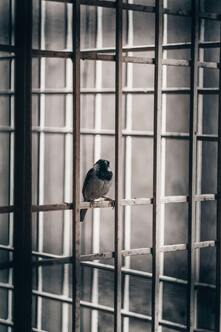 Tonight I pray for the most hated man in America. Not that he be comforted. Not that he find peace. But that he might know a thing we call Transformation. Because if there might ever be a moment of “Dear God, what have I done,” If there might be a shock of horror At glancing in the mirror, A slight shudder of “Whose blood is this on my hands?” Then maybe there can be this thing that we sometimes call Redemption. Atonement. Tonight I pray for the most hated man, But also For the ones who handed him a gun. For a nation that raised him to fear brown people, Grew him up to worship the idol of his own whiteness, And then handed him a gun again, saying “Here, go protect us From that one over there, With his hands pinned behind him. Go shield us from that man, Calling out for his mother.” Let there be a collective sigh tonight of Lord hear our prayer And what is it that we have done? And may we someday fully account for the number of souls, Beloveds, Whose blood runs in rivers down city streets In all this shining, sinful land. Tonight I will pray for the most hated man, For all the terror that the bars won’t keep out, For all the rage that the walls hold in. I pray Not for his comfort. Not for his peace. But that he might know a thing that we call Transformation-- even if we little know What it means. And I pray that he might, For the rest of his captive days, Speak with reverence the name of the one Whose breath he stopped On bended knee.
2 Comments
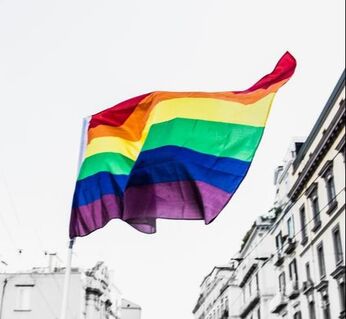 The world is not black and white. The world is not black and white. On this day in 1973, the American Psychiatric Association declared that homosexuality was not a disease. As with so many moments of progress, that seems both a really long time ago, and not that long at all. Today I’m leaning more on the side of ‘not that long at all,’ because here we still are, watching politicians hash it out over the full humanity of our friends, neighbors, brothers and sisters who do not identify as purely cisgender, heterosexual and binary. It’s confounding that some of our elected officials are digging in their heels to block LGBTQ rights when we are in the middle of a global pandemic and over half a million Americans have died; we are staving off an economic disaster; and the environment is sending red alerts, by way of deadly winter storms in Texas, that we must change our ways… This squabble over equality is what they want to hang their hats on? But here we are. The Equality Act, passed by the House this week, will now go to the Senate for a vote. The party line for those who oppose it is predictable: they are worried about religious freedom. The road from ‘gay rights’ to ‘religious freedom’ is a pretty twisted but also familiar path. Their bottom line is that businesses should not have to cater to a “lifestyle” to which they are opposed. So, just for instance, a conservative florist should not have to decorate a gay wedding. Or, to go one further-- a religious school should be able to fire a teacher if they find out he has a same sex partner, etc. But we can call b.s. on that action because what they are really, blatantly trying to do is protect the rights of an institution to discriminate. It has nothing to do with religion, nor does it have a thing to do with freedom. The First Amendment was intended to protect religion from government-- not to impose religion ON governance. This is a fine distinction that sends many of our ideological disputes into a spiral, ending with meaningful policy just circling the drain. But protecting the rights of LGBTQ folks in no way impedes your right to worship or practice your faith in private life. You can go to any church you choose, and do or say whatever you please there. In your own home, pray however you want. Even in public spaces-- go for it. Nobody can stop you from taking a bullhorn and loudly proclaiming your brand of gospel from the street corner next to the adult entertainment complex or the abortion clinic. Rage on, I guess. This is America. But if you operate a business, then you are operating in another realm of public life. You are functioning as part of the community--and there are certain covenants that bind you as a neighbor, as part of a wider economy, beyond the confines of your religious life. Embody those Christian values however you want in terms of your behavior, or what words and symbols you might display in your workspace. But how you function as an enterprise no longer falls under the purview of ‘religious freedom.’ Don’t want to hire a gay person or decorate a gay wedding? Perhaps it’s time to find a new line of work. The year is 2021. What has become clear to me as we hash these same arguments out, again and again, is this: spirituality itself is a lot like sexuality. There is a spectrum. And it is becoming increasingly acceptable to come out as nonbinary in terms of religious belief and practice. You don’t necessarily “believe or not believe.” You don’t have to be all in or all out. You are never just a saint or a sinner. You can hold doubt and devotion in the same spaces. The truly faithful do it all the time. The evolution towards nonbinary thinking is a big part of maturity in general, and faith development specifically. I’m reading Richard Rohr’s The Naked Now, and this is his entire premise--we are only surface living as long as we see the world in binary terms. Years of study in the field of faith development reveal the same truth. The ability to weigh critical thinking alongside our religious beliefs is essential. Otherwise, we are not really practicing faith, we are just being superstitious. Clearly, many of our leaders are still stuck in the infant stages of both critical thought and faith development. But my bigger concern is that so are our institutions. Both religious and the secular, church and state, remain stuck in this early-stage perspective that all things must be either/or. Like a toddler just developing spatial awareness and object permanence- did that toy just go behind your back, or did it disappear?? Here lies the very heart of so much discord. I hold out hope that the Senate will pass a vote for movement and change- a shift towards growth mindset and nonbinary thinking in general, and more to the point, an affirmation of the full freedom and dignity of LGBTQ folks. Even if the vote doesn’t go that way, we can keep moving in that general direction. We continue to evolve in both faith and critical perspective, moving towards not just a more equitable world, but a healthier, more productive way of living in it. I want our LGBTQ fam whose lives will be affected by this vote either way to know that, even if this measure doesn’t pass, we have your backs. That we are even still fighting about this is absurd, and I am sorry for it, truly. If we continue to be held hostage by regressive politics (and religion), please know that we will keep trying to find a better way. In the meantime, whatever comes, take comfort in this truth: the world is not a binary place. Very few things are entirely left or right, right or wrong, light or dark. Clearly, this is true of our institutions, both the faith-based and the secular. And the longer our systems of religion and government try to function in absolutes that don’t exist, the weaker they become. I’m never sure if that’s the good news or the bad news, but I do know this: embracing the beauty of the spectrum is the more life-giving way. Any existing structures that fail to see this will eventually crumble under the weight of their own rigidity. And when they do-- maybe what’s left is a better foundation. Colorful, resilient, free. Call your Senators and invite them to join us in this century. 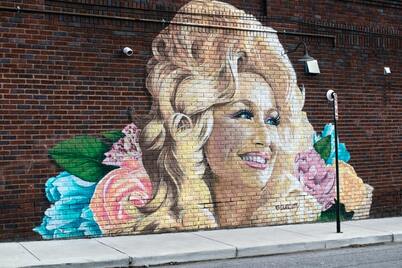 We already adored her. Of course we did. As a musician, she is legendary. An institution. I've been in that room in the house in Dollywood where they have all her awards, and it is too much for the eye to take in. And you just KNOW she's got a few favorites at home on the mantle too. Her body of work speaks for itself, accolades aside. There is a Dolly song for everything, and we know every word. But the music is not the only reason she is so beloved. There is an incomparable something about her that has always sparkled, always made you feel like you KNEW her, like you could run into her at the grocery store and she'd give you a hug. (Let me stop you now if you feel compelled to disavow me of this particular daydream). But at this particular moment in history, heavy and chaotic as it is, Dolly has emerged as something much more than iconic artistsand genuinely nice person. She is a unifying figure, one who has managed to bring hope, joy, and a kind of aspirational resilience to the present upheaval. Jad Abumrad explored this phenomenon in his podcast, Dolly Parton's America, even before the pandemic. If you have not already listened to every single delightful episode of this series, then congratulations: your weekend is planned! A philanthropist to the Nth degree, she has long provided scholarships for any kid from her hometown who wants to go to college. Fiercely committed to literacy, she has donated over 130 million books to children around the world. And just recently, she made a many-zeroes contribution to Vanderbilt Medical Center, funding research that made significant strides towards a coronavirus vaccine. It’s no wonder Tennessee wants to put a statue of her on the state’s very front lawn. And here, I think we might be coming around the heart of things, the intangible something that makes Dolly the incomparable force that she is, and it is this: she doesn’t want the statue. In response to the announcement she said “I am honored and humbled by their intention but I have asked the leaders of the state legislature to remove the bill from any and all consideration. Given all that is going on in the world, I don't think putting me on a pedestal is appropriate at this time” What it takes to step out of the spotlight in a moment like this is something more than just humility. It is a whole different kind of internal economy: one that defies individualism. This is what it looks like when you know that you don’t live for just yourself, and that nothing you have is really your own. Because when you get right down to it… you are just part of the neighborhood. More than anything else Dolly just gets that. As a rule, America operates on an economy of self-- glorifying independence and rendering individualism a uniquely American idol. Such an economy is rooted in ego; it values wealth, seeks status and power over communal wellbeing, and elevates “personal freedom” above all else. This is how one of the wealthiest and most privileged countries in the world ends up with one of the highest death rates in a global pandemic: because our toxic notions of 'personal freedom' somehow got caught up in a fight about masks and, well, here we are. These twisted notions of individualism also lead to things like: corporations get to do whatever they want, even if it means poisoning the environment. A de-regulated power grid in Texas that fails in catastrophic fashion and costs lives in a moment of crisis. Generations of systemic racism that we can't seem to even talk about without white folks hollering how "It's not my fault, I never owned slaves!" and "all lives matter!" in yet another communal failure of empathy. And the guns... let's get into the 'personal freedom' gun conundrum another day, because we're talking about Dolly here and I want to stay on task. Ultimately, what Dolly displays with her life is this wonderfully counter-cultural understanding of her place in the world. And it's hard to be counter-cultural when you are so deeply a part of the culture, you know? But that's what makes her kind of extraordinary. She has this internal economy, not of independence, but of INTERdependence. And I think deep down, we all know that is the way. Now more than ever. For my part, one of the things that I've always loved most about her is her accent-- here is one of the only truly famous people in the world who comes from that part of the world and yet did not somehow water down or eliminate her dialect to make herself more relatable to folks on the outside. Though I'm sure she's been pressured at times to talk more "regular," I hear home when she talks, and I love that she represents my people and my place out there in the wide world. That sense of place is what people see in her that sparkles, that connects, that we want to somehow emulate but don't know how. Here is a woman who has more fame, fortune, and power than any of us would know what to do with; and yet she continues to honor her roots, and to take her place as part of a larger whole. Giving back to make communities stronger, to give families a future--maybe even to help end a global pandemic. But she'll pass on the statue, thanks. She is just part of the neighborhood. If we want to be like Dolly, but no one is offering to build us a monument that we can turn down (just speaking for myself here) then where to begin? All I can say is, it has to do with transforming our internal economy from one of independence to one of interdependence. To start: know where you're from. Then, just take your place in the neighborhood. Be who you are. Show up for folks. Sing a song. Read a kid a book. Give something away. Maybe see what comes to life from there. We will always love you, Dolly! These are just a few of the reasons why. 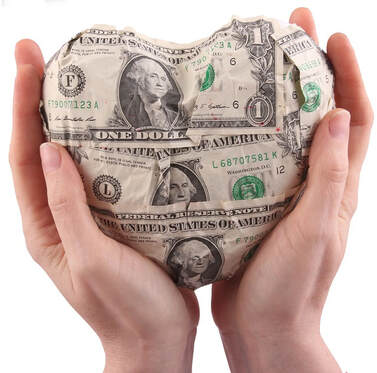 Americans will spend about 21.8 Billion dollars buying Valentine's stuff this year. That's nearly $4 billion more than it was last time I looked up that number, about 4 years ago. When I think about what we could do, collectively, with nearly $22 billion, it boggles the mind. No, scratch that-- it literally breaks my heart. For one thing, it would cover our National Parks budget for about 8 years. Or fund the National Endowment for the Arts for a few decades. How many hungry children could be fed? Student loans forgiven? Refugees resettled? We could make a longer list, but you get my point- we have the resources in this country to do so much collective good; to meet so many needs; to solve so many complex problems. But when you come right down to it-- our hearts are just in all the wrong places. Valentine's Day itself is not the problem. A holiday designated for love? Sure. Fantastic. But... when did “love” get saddled with all this stuff? Billions and billions of dollars worth of stuff? I’d venture that most of the billions are spent on flowers, jewelry, stuffed animals, and any other number of things that come in the shape of a heart. Which, by Monday, will be marked down 80% at Walgreen’s and Target and every other store in America. Not long after that, much of it will be in a landfill. This holiday is just one of many that draws attention to our consumer sickness. That sickness is big, and multi-layered, and it’s not Saint Valentine’s fault. It’s also not the fault of Baby Jesus or the Easter Bunny; or Saint Patrick, the Great Pumpkin or Uncle Sam. On every one of these days, we wade through the sea of sugar and cheap plastic crap that will ultimately flood the landfills we use to hide our addiction. The dam will only hold for so long. So there’s an environmental concern, and a sweatshop concern. But more than anything, there's a heart concern, underlying all the paper and diamond ones. The real emptiness that might make us feel like we *have* to buy this stuff, or else we have somehow failed at the whole love thing. More to the point, this is an illumination of the scarcity mentality… The one that tells us we cannot possibly afford to insure all of our children–or educate them, or provide them with clean water and air, or protect the resources for their retirement someday–when clearly, we have all the money in the world to spend on… What, exactly? Another engraved picture frame? Another charm for that bracelet? Another bear holding a heart? (What can I say, SNL gets it). Can we fix all of these complex problems by abstaining from flowers and stuffed animals today? Maybe not. But practicing a bit of mindfulness about our own spending and gifting can go a long way to change our thinking about what is needed, what is important, and what is worthwhile. And that shift might, in turn, change our thinking about what we can, and cannot afford… As a family, as a country, and as people who have to inhabit this earth together long after the landfills overflow and the rivers run dry. Here are a few ideas for how to celebrate this day of love without breaking the bank–or contributing to our collective national junk pile.
This is modified for COVID times from a post that originally appeared on Patheos. 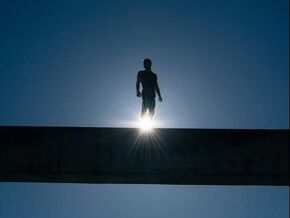 Whether we are team Marvel or DC; Jedi or Enterprise; Potter or Percy Jackson, we all have our favorite hero stories. And don't get me wrong, I love them too. These stories, and the worlds in which they take place, are filled with joy, hope, and glimpses of the extraordinary. But for us everyday mortals, the love of the extraordinary can be a problem. You’ve probably seen the story going around about the high school principal in South Carolina who works the night shift at Wal-Mart, donating his paycheck to students and families in need. This story has gone viral, and is billed as a ‘feel good’ feature in the newsfeeds. But I find way too much about the backdrop of this story troubling to feel good about it. That is not to diminish in any way the incredible kindness and sacrifice of this dedicated educator. I’m just concerned about how readily we laud such individual acts of mercy, without questioning the corporate realities that make such acts necessary. We celebrate a man who will jump into a chasm of need-- but we don’t jump to close the chasm. Furthermore, we celebrate the employer for donating $50,000 to the local high school; without acknowledging that employer’s role in creating the chasm in the first place. The reality is that a company with the reach and resources of Wal-Mart could help create meaningful solutions to complex social issues if they wanted to… but they don’t. For starters, as a baseline minimum, they could pay their employees a living wage and interrupt the cycles of poverty. But they don’t. Another layer of reality here is that educators like Principal Darby are, themselves, underpaid. Because we (the collective “we,” and the representatives we elect) have systematically defunded public education for decades. This means not only that our educators are not valued as they should be; it means, also, that generations of adults are not equipped with the tools they need to be successful in this economy so fraught with chasms. In such an economy, we are eager to celebrate a wealthy philanthropist for donating a million dollars. Which is the equivalent of you or me throwing some change in the [insert local cause] jar at the Circle K. Is our heart in the right place when we drop those dimes? Sure. Did it truly cost us anything to make that donation? Not really. We marvel at the benevolence of billionaires. But we don’t ask that billionaire to look into the chasm--that growing divide where a few at the top of the food chain have more and more power, while untold millions go hungry. We scarcely want to look into that chasm ourselves. It feels better, of course it does, to read the feel good stories. Seeking emotional satisfaction over economic reformation, we put band-aids on amputation sites. We are led to build more temporary shelters and emergency relief programs instead of seeking lasting solutions to poverty. We value individual acts of mercy over communal acts of justice. I have a theory that this dynamic is related to the American bootstraps narrative, that toxic fairy tale that everyone has the same chances, and begins at the same starting line… and if we just work hard enough, we, too, will find our fortune. Those who live in need must be somehow lacking in their effort or worthiness, right? Meanwhile, the (diminishing number of) middle class folks emerge as the heroes of our own stories. In the spinning of this particular tale, we don’t just seek a savior; we also want to be one. At the personal/individual level, of course. Where this gets messy is… well, if the bootstraps narrative were real, we wouldn’t need heroes at all. Everyone would have enough, and we could go about practicing individual kindnesses without the need for radical social transformation. It’s complicated. What I know is that people like Mr. Darby, and anyone else who works and lives and gives to make their communities a better place, should be celebrated. That isn’t the problem. The problem is, we cannot “feel good” about these individual acts of mercy without also questioning the world in which such needs arise. In so many ways, it is a world of our own making. The more we idolize wealth and individualism, the more we elevate the wealthy; and in turn, subjugate the poor. It is no surprised that our dubious values system has elevated leaders who are, themselves, corrupted by wealth, and govern only in the interest of the wealthy. This unbalanced world we have built, by extension, is a world that only we can change. In that regard, then yes, I guess we do need heroes. And what do all of our favorite hero stories have in common? Our heroes learn that they are nothing alone. Their "bootstraps," or any other special powers that they have, are almost always an illusion of sorts. They need a tribe, a team, a league, an order, to do any sort of meaningful good. Sure, one alone can save a kid from a burning building, neat trick. But to keep the whole city from burning--to save the ship, to stop the bomb, to push back the forces of darkness-- they need each other. As we continue to recognize and celebrate individual acts of kindness, we should also be watching and supporting those who work for meaningful justice. Organizers working to raise the minimum wage; community leaders working to address systemic racial injustice, particularly in our education and criminal justice systems; educators fighting for the very concept of true ‘public’ education; scientists working against the clock to protect the environment; and many of you who are marching, writing, calling, gathering, and doing whatever it takes to bring about change at your local level. Wherever you are, find the folks close to home who are digging deeper, and then go put yourself in that story. Heroes don’t ignore the chasm. They face it-- and then they jump in. |
Archives
March 2023
Categories
All
|
